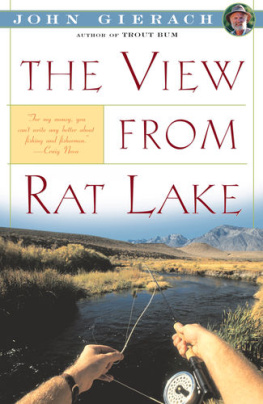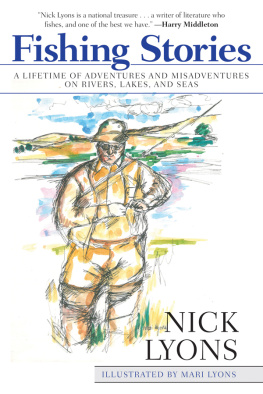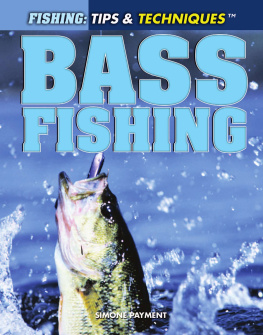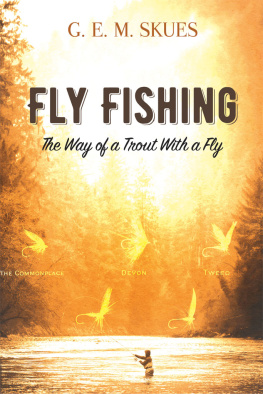ALSO BY JOHN GIERACH
Good Flies
Death, Taxes, and Leaky Waders
Standing in a River Waving a Stick
Fishing Bamboo
Another Lousy Day in Paradise
Dances with Trout
Even Brook Trout Get the Blues
Where the Trout Are All as Long as Your Leg
Sex, Death, and Fly-fishing
Fly-fishing Small Streams
The View from Rat Lake
Trout Bum
Fly-fishing the High Country
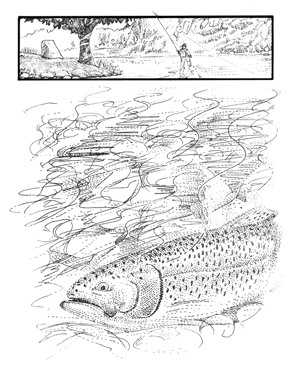

At the Grave of the Unknown Fisherman
JOHN GIERACH
Illustrated by Glenn Wolff
SIMON & SCHUSTER
New York London Toronto Sydney Singapore
Copyright 2003 by John Gierach
All rights reserved, including the right of reproduction in whole or in part in any form.
SIMON & SCHUSTER and colophon are registered trademarks of Simon & Schuster, Inc.
For information about special discounts for bulk purchases, please contact Simon & Schuster Special Sales: 1-800-456-6798 or business@simonandschuster.com
Illustrations by Glenn Wolff
Manufactured in the United States of America
10 9 8 7 6 5 4 3 2 1
Portions of this book, in different form, first appeared in Fly Rod and Reel, Grays Sporting Journal, and The Redstone Review.
Library of Congress Cataloging-in-Publication Data
Gierach, John, 1946
At the grave of the unknown fisherman / John Gierach.
p. cm.
1. Fly fishingAnecdotes. 2. Gierach, John, 1946- I. Title.
SH456.G545 2003
799.124dc21 2002036541
ISBN 0-7432-2992-4
ISBN 13: 978-0-743-22992-0
eISBN 978-1-439-10842-0
www.SimonandSchuster.com
I was awfully happy, not because life was so good, but because it was my life, and I was in it.
SCOTT SPENCER
CHAPTER 1
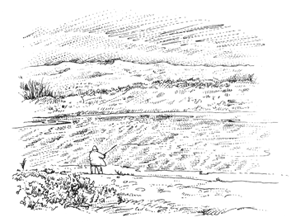
By the calendar at least, it was early spring instead of late winter, although in the Rocky Mountain west that really is just a technical distinction, since one can be about as raw and unfriendly as the other. Four seasons have never been enough to adequately describe the weather here or anywhere else, for that matter. There should be at least a dozen, and they should designate the unstable edges where one set of conditions shade into the next, because those are the most interesting. The whole idea of seasons would be more useful if theyd been named by fishermen instead of astronomers.
Anyway, it was just before the last big snowstorms that come before mud season, and some friends and I were in Wyoming fishing some prairie lakes on a ranch the size of a small New Hampshire county. It was still too early in the season for these lakes to fish well (theyre said not to really turn on until sometime in May), but this was when the invitation came, so this is when we went.
Too early or not, I was ready. It had been a long winterfishingwise and otherwise. The big snowfalls in the mountains came late that year and the snowpack was high. The cozy romance of daily fires in the wood stoves at home had begun to lose some of its charm, and the scattered, almost warm days wed had only meant that the local streams would soon be swollen with the runoff from all that snow and unfishable until late June.
Of course, a writer needs big chunks of time for work, and a fishing writer desperately needs for the fishing season to endat least for a while. The season never does officially end here, but it ends effectively, which means you can fish if you want to and if you can stand it, but you dont have to.
I enjoy the writing as much as I do the fishing, so at first winter is almost a relief. By November its clear that there wont be any good fishing to speak of for five months, and at the moment that seems like soon enough. Its not that Im tired, just well fished as a friend says, and now its time to sit back and practice my other skill: the one that pays the mortgage and lets me fish for the other seven months a year.
So when winter first comes, Im all for it, but toward the end Ill find that in my off time Ive been doing things like idly studying the properties of firewood. I can tell you that silver poplar burns well but too fast. Oak is slow, hot and businesslike, good for cooking and cold nights but not too exciting. Maple and walnut are close seconds to oak, and sometimes while splitting wood Ill find a walnut burl thats so intricate and pretty that Ill give it to a rod maker friend for reel seats instead of burning it. Osage orange is hard to get, but its dense, muscular, heavy as coal, and relentless, so its good for banking and damping down. Cottonwood is a signature tree of the west and one of my favorites, but it doesnt like to be used for firewood, so it pouts and stinks and puts out little heat. Pine isnt rated high as fuel, but I like it because it snaps and roars and seems to generate heat out of pure enthusiasm. I use pine on days when I want a happy fire.
I can also say that wood split by hand seems clean and orderly because with a wedge and maul you have to find the spot where a log wants to split, not where you want it to split. Wood from a mechanical splitter looks more torn and brokensort of like wreckageand, as a practical matter, it has more splinters.
Contemplating firewood is an interesting enough way to while away some time, but it may also be a sign that winter has ground on a little too long. Thats how some winters can go. Before this one was over, the season had begun to seem like a preview of mortality, and I got the shack nasties so bad I just barely avoided ice fishing.
There were five of us in Wyoming that week: me, Mike Price, his friend Cliff Rice, and Bob and Mary Smith, fishing guides out of Saratoga who had access to the ranch. The first morning was dark and chilly and could have passed for November. During the height of fishing season, the little town of Saratoga bustles, but that week the place had a Sunday morning vacancy about it. Nothing much seemed to be going on, and it felt odd to be busy. We stowed our gear in a Suburban, and then Bob went out back to trailer up a couple of all-terrain vehicles he said wed probably need. No one had been in to the lakes yet that year, but he was guessing that the last few miles in to some of them would be close to impassable.
The ATVs seemed like overkill, but I grasped the problem when we pulled off the paved road and started up onto the first bench of land on the ranch. The way the weather had been, these clay tracks would turn from dirty ice to slush to outright mud during what passed for the warmth of the day, and then slowly turn back again in the afternoon. At the moment they were ankle-deep and slimy under a delicately transparent sheen of brown ice that crackled under the tires. The trailer fishtailed. Things were starting to look expeditionary. It was clearly too early for real, paying clients.
Novelist Annie Proulx once described the Wyoming high plains as dangerous and indifferent ground, but Ive always liked them in spite of thator maybe because of it. Theres pine and juniper on the slopes of the foothills under the bare rim rock, petering out as you come down from the high ridges, and patches of cottonwood in the few places where theres water and shelter from the wind, but in the open everything is low, tough, scrubby, and sparsesage and rabbitbrush, cactus and short grass. Theres always a direction you can look that lets you see forever, and even when you cant spot them, you always have the feeling youre being watched by antelope.
Next page


